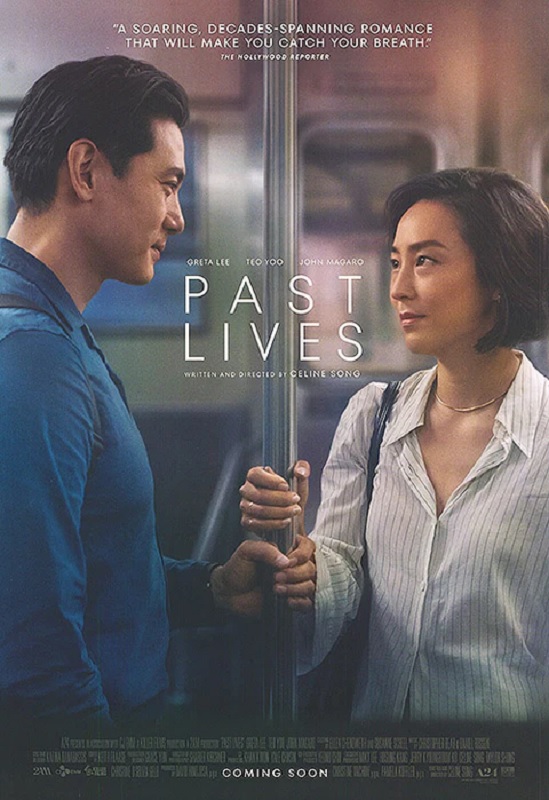

2023 – Past Lives
Sigh… Ok, I’ll just say it. This was an interminably boring film. I’m sorry, but I found it to be slow and pretentious, plodding and uninteresting. Watching people stare at each other without saying anything is not deep. It’s boring. Long and meaningful looks just don’t translate well onto the big screen. While I was watching this movie, I was reminded of those hyper-minimalist French films that are often made fun of. I’m actually only guessing at this, as I’ve never actually seen one of those movies, though they are parodied all the time in pop culture.
And I think maybe there was supposed to be a romantic love triangle thing going on between the only three significant characters in the narrative. There was supposed to be a “who will she end up with” vibe going on. But it didn’t work at all for me. It was just a dull film that, honestly, felt too self-important. It was trying way too hard to be deep, and it just made the whole thing feel forced. The theme was not supposed to be that of unrequited love or missed opportunities. It was about pining for the unknown life that could have been, had fate turned you in a different direction. But I think that even this mark was missed.
The narrative follows a Korean woman whose family immigrated to Canada when she was a small child, and she moved to America as an adult. While going to school in Korea, a twelve-year-old Na Young had a childhood sweetheart named Hae Sung. Her family moves, and we skip to Na Young, now called Nora, and played by actress Greta Lee, as a twenty-four-year-old woman in New York City. . Hae Sung, played by Teo Yoo, has never forgotten her.
Hae Sung looks her up and the two reconnect through video chatting. But Nora wants to focus on her career as a writer, and ends the long distance friendship. While on a writing retreat, she meets and falls in love with Arthur, a gentle, soft-spoken Jewish man, played by John Magaro. The two marry, and it is another twelve years before Hae Song finds her again. Arthur wonders if he is standing in the way of a life Nora could have had with Hae Song, and if she married him only to obtain a green-card. She assures Arthur she loves him and is with him because she wants to be. Hae Song comes to visit her in New York, and the two spend two days together reconnecting again. But after a lot of slow conversation, the two come to realize that Hae Song was less in love with Nora, and more with the idea of her. He missed the twelve-year old he knew, a girl who no longer existed.
This is where the movie tries too hard to be deep and philosophical. Were we really meant for each other? What if you had never left Korea? Did we know each other in a past life? Will we be together in our next life? Unfortunately, as the viewer, I just didn’t care. Because when it came down to it, Nora was happy in the marriage she had chosen, and had no desire to shift her affections to Hae Song. I saw no conflict, and so no resolution was needed. Was there even tension between Hae Song and Arthur? No, there wasn’t. They were both respectful and courteous to each other. Virtually all the emotional content was centered around wistfully wondering what might have been, and I’m sorry, but it didn’t make for a very compelling narrative. It was just uninteresting.
I think my favorite of the three characters was Arthur. He so easily could have been written as a jealous man with feelings of inadequacy. True, he had a little insecurity, but only a little, not enough to make him fearful of losing his wife. He was kind and understanding, and he just seemed like a genuinely nice guy. But that’s just it. He seemed to epitomize the feel of the entire movie. He was ordinary. He was easy and non-threatening. And I think that was supposed to be part of the movie’s charm, its ordinary and easy characters, settings, visuals, dramas, and tensions. It was a slice of life-film that maybe tried a little too hard to be philosophical and emotional.
One of the things about the movie I did like was the music. Written by Christopher Bear and Daniel Rossen, It did a great job of fostering a feeling and an aesthetic of profound melancholy. It was sad and a little heavy handed, but it fit the story. While Hae Song was visiting in New York, it was raining, with gray skies and heavy clouds, weather of which I happen to be very fond. The atmosphere of vague uncertainty and wistful regret was achieved, and I liked it.
I guess what I’m saying, in conclusion, is that this wasn’t a bad movie. But at the same time, I wouldn’t call it a great movie. It was average. It was just a little slow and bland for my tastes, and I wouldn’t have nominated it for Best Picture. And I’m well aware that my opinion is not the popular one. To quote Wikipedia, “On the review aggregator website Rotten Tomatoes, 95% of 300 critics’ reviews are positive, with an average rating of 9.0/10. The website’s consensus reads: “A remarkable debut for writer-director Celine Song, Past Lives uses the bonds between its sensitively sketched central characters to support trenchant observations on the human condition.” But if you ask me, that’s the movie’s downfall, not its power. Too much philosophical thought and not enough engaging drama. But oh well. What do I know?








